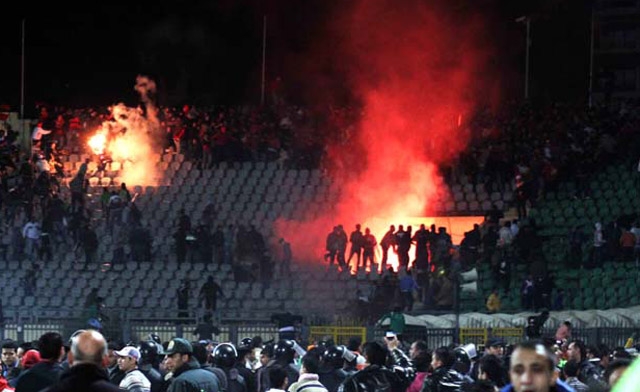By Raghda El-Halawany
CAIRO: Experts are divided on the recent suspension of privately-owned religious satellite channels, with some calling it a strategy aimed at curbing media freedom, and others applauding it as a step to a more stable society.
Last month, Egypt’s state-owned NileSat temporarily suspended many satellite channels for violating broadcasting licenses by inciting religious hatred and violence, providing medical advice given by unqualified individuals, and promoting unlicensed pharmaceutical products.
Information Minister Anas El-Fiqqi said the decision was taken after “extensive studies that indicated a near doubling of these channels over the past year.”
NileSat closed down more than 12 channels and El-Fiqqi issued warnets for 20 other channels to abide by broadcasting regulations.
“These corrective measures are intended to protect the Egyptian and Arab public from broadcasters determined to make calls for murder, and endanger people [who live] with serious illnesses — all in the pursuit of profit and [promoting] extremist ideologies,” El-Fiqqi said in a statement.
Head of Al-Ahram Center for Translation and Publishing Wahid Abdel Meguid explained that such satellite channels are a manifestation of Salafi movements.
“Those Salafi movements flourished in a fertile environment, where Al-Azhar was absent, government was lax, and people were hungry for religious teachings,” Abdel Meguid stated. “So these channels came along inciting division, and importing culture that doesn’t match our moderate Egyptian society.”
However, Abdel Meguid maintained that the solution to sectarian strife does not lie in closing down a few channels.
“Decisions of closing any channel or newspaper are closely connected to curtailing freedom of expression, but the responsibility of tackling sectarian tension should be handled by a political system which is capable and willing to resolve the discord [which is] not simply [accomplished by] shutting down media outlets,” Abdel Meguid said.
On the other hand, some think that the decision to suspend such channels was long overdue. Hosni Nasr, a journalism professor at Cairo University, told Daily News Egypt that those channels had breached every possible code of ethics.
“When you exploit religion, use people’s pain, and disrupt your society’s harmony just to add to your bank accounts, that is a real violation of ethics,” Nasr said. “There are firm legislations worldwide that punish anyone who endangers their country’s security.”
Although Nasr believes that such measures might put Egypt’s media freedom into question, he maintains that censoring and blocking channels might provide the needed control over the “hate spreading channels.”
Sobhi Essaila, from the Al-Ahram Center for Political and Strategic Studies, explained to Daily News Egypt that the number of Arabic-language satellite channels has grown to exceed 400 channels.
“The number had been steadily increasing over the past decade and a half; this outcome portends dangerous ramifications for national security and social stability in a country like Egypt, where public opinion could become a puppet in the hands of satellite channels.”
In a country where most people depend on TV as a primary source of political news, TV channels have the best shot at shaping public opinion.
In the same context, last month the government tightened the noose on some other independent TV channels, with the General Authority for Investment (GAFI) deciding to suspend the licenses granted to “Khaleegyah,” “El-Nas,” “El-Hafez,” and “Health & Beauty,” and to issue notices to ONTV and Al-Faraeen.
Although the company that owns all four of the suspended channels repeatedly denied it, GAFI Chairman Osama Saleh stated that many warnings were issued before the suspension decision, which was an action taken as part of a larger plan to monitor media irregularities.
Saleh reiterated that this decision had no political agenda.
Ahmed Anis, chairman of the Egyptian Satellite Company (NileSat), stated that all channels whose licenses had been suspended will be able to re-broadcast on NileSat once it has been certified that they have taken measures to correct the violations outlined in the bases of their license suspensions.
Religious channels first hit the small screen in 1998, when Saudi billionaire Saleh Kamel launched “Iqraa” as part of the ART satellite television network. Saudi businessman Prince Walid bin Talal then launched “Al-Resala” in 2006 as part of the Rotana satellite network, followed by Mansour bin Kadsa the same year who launched “Al-Nas,” which started as an entertainment channel but was later converted into a religious channel.
Apparently the resounding success of “Al-Nas” as a religious channel persuaded Kadsa to convert another entertainment channel he owns, “Khaleegyah,” into a religious one as well.
Hours after suspending the channels’ broadcast transmissions, many of the channels’ supporters launched campaigns on Facebook. A group called “Against Closing the Four Religious Channels” attracted 14,000 members within a few weeks.
“There must be a parallel Islamic satellite [to counter] … indecent [non-religious] channels that deface youth,” Hoda Barakat, a 27-year-old member of the Facebook group, told Daily News Egypt.
The Egyptian Journalists’ Union accused the government of plotting a “conspiracy” against the media after a series of crackdowns on two popular talk shows and Al-Dostor’s former chief editor Ibrahim Eissa, which were countered by the launch of a new channel by steel mogul Ahmed Ezz.
Information Minister El-Fiqqi also ordered the reissuing of new licenses for private TV satellite uplinks. Once the order is implemented, many might view the action as a governmental attempt to have heavier oversight over private TV coverage.
The Arabic Network for Human Rights Information (ANHRI) expressed concern over the crackdown on satellite channels that “came during a sensitive time for Egypt, with parliamentary elections slated for November.”
Gamal Eid, head of the ANHRI, believes that the recent crackdown, live broadcasting permit requirements, the suspension of two talk shows — including Amr Adib’s “Al-Qahera Al-Youm” — and the crisis at Al-Dostor are all steps putting press freedom at a standstill.

